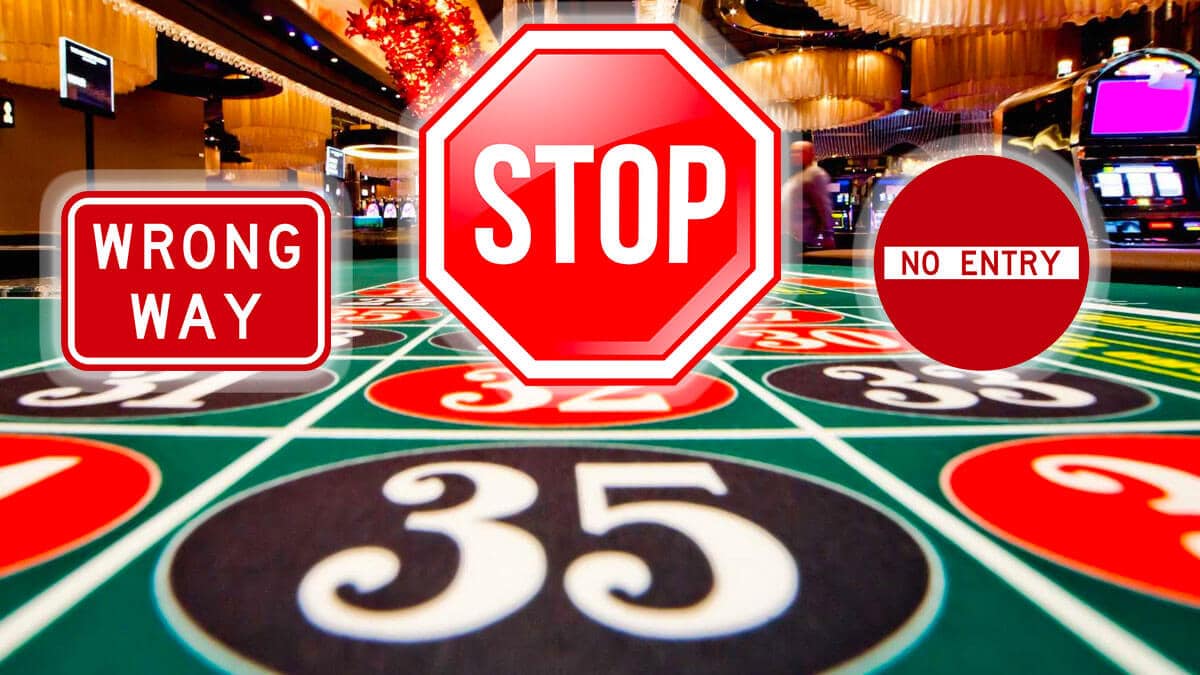What Is Self Exclusion and How Does It Work?

The ease and convenience of modern gambling have created a new golden age of casino and sports betting. This is excellent news for most bettors, but not everyone has benefited from the increased accessibility of gambling options.
Gambling addiction is a serious issue and one that will only become more prevalent as the industry continues to grow. Luckily, there are simple steps that anyone suffering from this issue can take to treat their addiction. This guide will break down the basics of gambling self-exclusion programs, including how they work, who they are for, and when to know if they are right for you.
Understanding Self-Exclusion
Governments that permit the operation of gambling within their jurisdictions take safety measures and adopt specific programs to combat gambling addiction. Some of these efforts, such as self-exclusion programs, work with direct cooperation with the casinos they oversee.
So, what is a gambling self-exclusion program? Simply put, these programs allow bettors to willingly put themselves on a no-fly list, so to speak. By opting into a self-exclusion program, you are telling the casino or sportsbook not to allow you to use their services anymore.
There are many forms of self-exclusion programs. For instance, some programs prevent you from using the provider at all, while others allow you to set betting limits. Once you meet the agreed-upon time or money limit, the operator will prevent you from betting anymore.
Casinos and sportsbooks can ban players for various reasons, but self-exclusion is a separate issue. As the name suggests, you must decide to use self-exclusion options. These programs can help empower individuals struggling with gambling addictions, but it also means that you cannot volunteer someone else for a self-exclusion program.
Eligibility and Enrollment
A self-exclusion program can be an excellent tool for heading off a gambling addiction at the source. But who is eligible for them, and how do you enroll in a gambling self-exclusion program?
The first answer is simple: anyone and everyone who wants to join a self-exclusion program is usually eligible to do so. A few common gambling addiction warning signs to look for include:
- Constantly thinking about gambling
- Increased pressure to bet more to win back losses
- Feeling a lack of control when gambling
- Continued gambling despite significant financial and other negative consequences
You can also use resources like the National Council on Problem Gambling’s self-assessment tools to see if your gambling habits warrant intervention.
How to Enroll in Gambling Self-Exclusion Programs
How you enter a program will vary slightly from site to site. Where you live, and the type of gambling you engage in can also play a role in the process.
Here are the basic steps you should follow to join a self-exclusion program.
- Admit you have a problem: Most gamblers do not need self-exclusion programs. However, if you do develop a gambling addiction or are showing signs of problem gambling, admitting you ended help is always the first step.
- Research exclusion programs or contact the operator: In some areas, like the UK, there are national self-exclusion programs. If these are unavailable in your country, try contacting the casino or sportsbook directly. Many modern operators offer their own unique self-exclusion programs.
- Opt into the program: Self-exclusion is a voluntary process. Once you have found the right program and are ready to start, simply sign up and provide the required information.
Self-exclusion will look different depending on where you live. For instance, in Pennsylvania, the Pennsylvania Gaming Control Board (PGCB) offers self-exclusion resources for various types of gambling. You can even sign up for a self-exclusion list that will prohibit you from gambling at any regulated casino or sportsbook in the Keystone State.
Many operators also offer self-exclusion options. Bovada, for instance, makes it easy for members to limit or stop their gambling activities. Simply contact customer services to hold or permanently disable your account temporarily.
Mechanics of Self-Exclusion
Two entities—you and the gambling establishment—are responsible for enforcing self-exclusion programs. You are responsible for joining the program and not trying to subvert it after it starts. Self-exclusion can be a great safety net, but it will not work if you do not set it up or tamper with it.
Once you are enrolled in a program, gambling establishments under the program’s jurisdiction are, in theory, also supposed to prevent you from gambling. Suppose you opt into a self-exclusion program at a top casino site, for instance. In that case, the casino is responsible for enforcing the agreed-upon betting limits or disabling your account and not allowing you to create a new one.
The process looks a little different at land-based gambling sites. Brick-and-mortar operators often rely on facial recognition software to help them identify players violating self-exclusion agreements. If you joined the program at a state or country-wide level, you often must provide information about yourself to help operators stop you from gambling.
In PA, for instance, you must provide the following information when signing up for the state-wide self-exclusion program.
- Name, including nicknames and aliases
- Date of birth
- Address
- Telephone number
- Social security number
- Physical description of yourself
- Government-issued ID
There are usually measures to discourage players from breaking their self-exclusion agreements. For instance, in some areas, you can be charged with trespassing if you violate the agreement. Also, many operators are allowed to refuse payouts of winnings if the player is part of a self-exclusion program.
Effectiveness and Limitations
On paper, self-exclusion programs are accessible and relatively convenient treatment options for problem gamblers. But do gambling self-exclusion programs work?
The short answer is yes, but the long answer is more complicated. A 2021 study by Igor Yakovenko and David C. Hodgins found that voluntary self-exclusion programs helped participants gamble less and spend less money when they did gamble. Participants also reported a decreased need for other gambling-related treatments.
Yakovenko and Hodgins’s study involved two groups, and all the participants were part of a voluntary self-exclusion program. The first group participated in an online self-management program, while the other attended an in-person self-awareness workshop. As noted above, both groups decreased their gambling activities, but there are no measurable differences between the other variables.
The good news is the self-exclusion programs helped to reduce gambling among vulnerable participants. However, these programs are far from foolproof.
First and foremost, as with any type of treatment, participants have to be willing to work on their problem gambling for self-exclusion programs to be effective. Convincing those with gambling issues to recognize their struggles and follow through with treatment is easier said than done. Also, while self-exclusion can be effective in reducing gambling, a 2023 case study found that these programs need an increase in publicity, availability, and technology-based monitoring.
Legal and Ethical Considerations
Casinos, sportsbooks, racebooks, and other gambling establishments are like any other business. They rely on customers, especially returning customers, to make money. However, the line between being a good, loyal customer and having a gambling addiction can be blurred at times.
This creates a problematic ethical conundrum for operators, as this is the first time morality and capitalism have conflicted. Generally speaking, gambling operations side with the decision that is best for PR and maintaining a positive public image. In this case, that means offering self-exclusion programs to protect vulnerable gamblers from themselves.
From a legal perspective, operators can deny service to prospective customers as they see fit. With a voluntary self-exclusion program, customers agree beforehand to be denied services.
State-sponsored or nationwide self-exclusion programs work the same way. Customers agree to be excluded from the services offered by the regulated operators under the jurisdiction of the program.
Support and Resources
The explosion of gambling options in recent years has been great news for responsible bettors. On the other hand, the increased availability of betting outlets can make it nearly impossible for gambling addicts and problem gamblers to refrain from gambling. The good news is that more resources than ever exist for people seeking support in refraining from betting.
A few of the online resources for gambling addiction include:
- SAMHSA’s National Addiction Helpline
- HelpGuide’s gambling addiction and problem gambling self-help guides
- SMART Recovery gambling addiction treatment tools
The National Council on Problem Gambling also offers a helpful list of gambling addiction resources by state. Governments outside of the US also have useful resources, such as those provided by the Gambling Commission in the UK and the Gambling Support Services offered by the Department of Social Services in Australia.
Is Gambling Self-Exclusion Right for You?
When enjoyed responsibly, gambling can be a fun and financially rewarding pastime. However, if you struggle to control your betting activities, then a voluntary gambling self-exclusion program may be right for you.
Read the guide above to learn about self-exclusion programs and how they work. Researching self-exclusion options in your area or at your favorite betting establishments is also a great way to learn more about these types of programs.

 Author:
Author: 